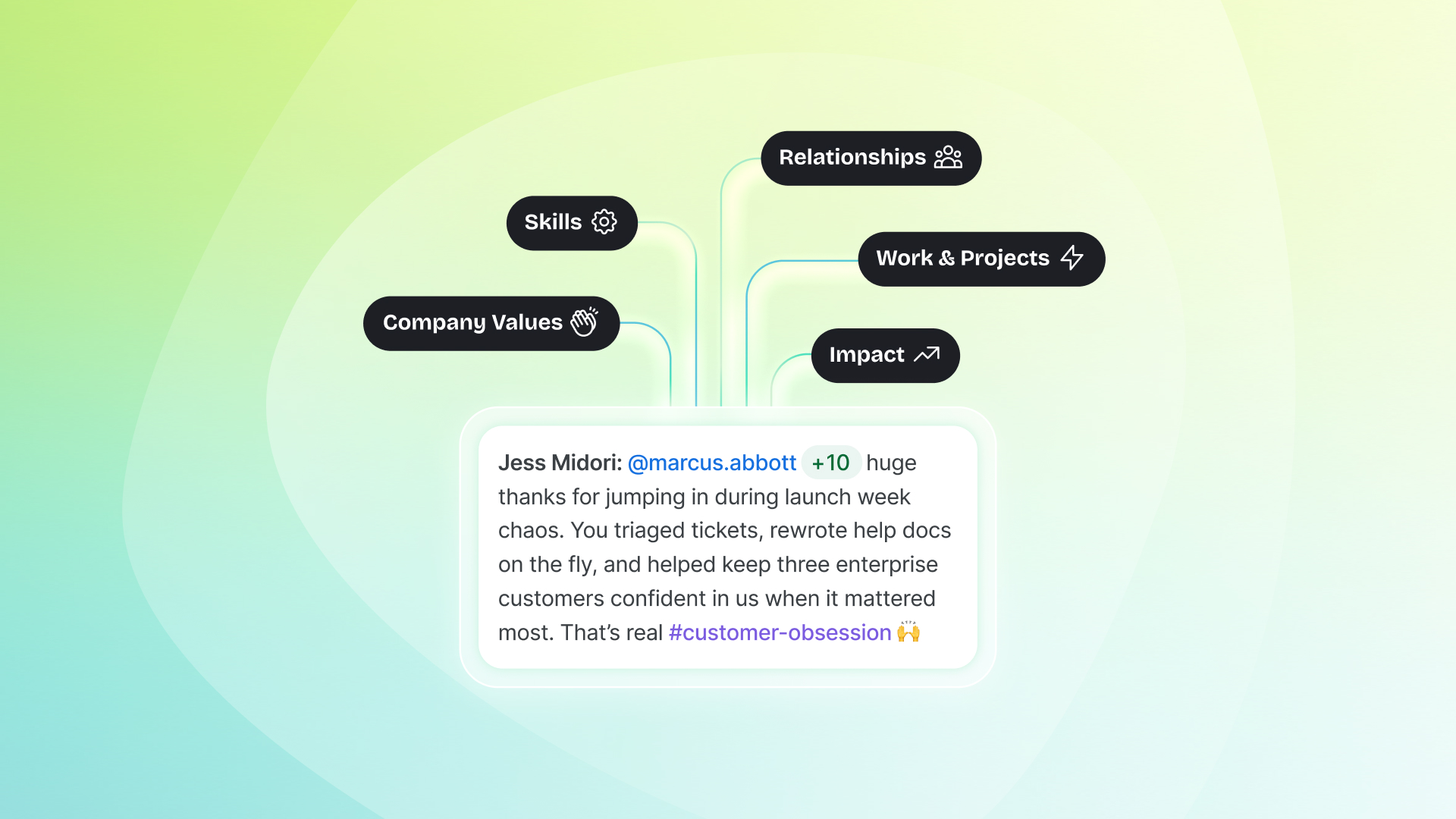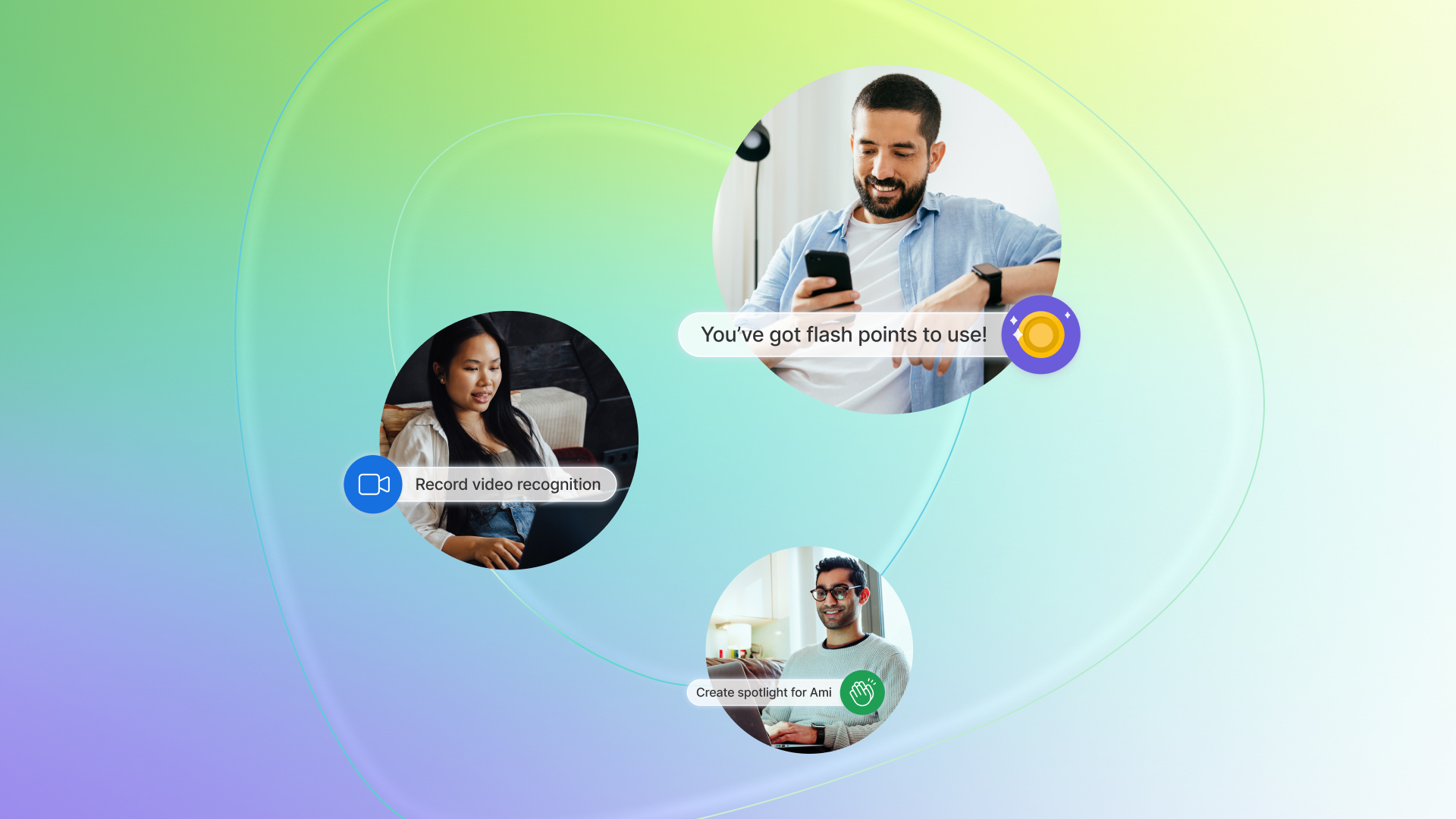7 Benefits of Giving & Receiving Employee Recognition

It’s almost time to celebrate Thanksgiving, so here at Bonusly, we’re thinking a lot about thankfulness. That’s at the heart of recognition, after all—thanking and appreciating employees for what they contribute to your organization every day.
Aside from making you feel all warm and fuzzy inside, recognition in the workplace has powerful benefits. Those benefits go to the receiver of the recognition, of course. But did you know there are also benefits to giving positive feedback? (They’re pretty incredible too.)
So in the spirit of the season, let’s explore the joys of both sides of employee recognition—giving and receiving it.
Download Gratitude Bingo for a free and fun activity at work for teams to do any time of the year.
The benefits of giving employee recognition
1. Giving recognition creates stronger working relationships
Knowing that your colleagues, managers, and leaders see and appreciate the work you put in can create stronger relationships. You don’t just feel like a cog in an impersonal machine—you feel like a trusted, valued, and important person.
And those relationships make work more productive, more profitable, and a whole lot more pleasant too.
As humans, we have a deep need to be validated and understood.
Telling people what you value about them shows a deep and genuine appreciation for what they do and how they contribute to your organization. It’s both recognition and appreciation in one—and that combination is more powerful than either on its own.
[We] all want to know one thing: ‘Was that OK?’ ‘Did you hear me?’ ‘Do you see me?’ ‘Did what I say mean anything to you?’
-Oprah Winfrey
When you make a regular effort to thank the people around you for what they do, even for small tasks like answering your urgent email promptly or larger ones like spearheading a chaotic and complex project, they know that you saw their hard work, collaboration, or attention to detail and took the time to value it out loud.
Those moments of recognition accumulate over time to foster stronger, deeper relationships with the people you work with—peers, leaders, and employees alike.

2. Giving employee recognition increases empathy
Making a diligent effort to give encouraging feedback more often can also make you a more empathetic leader and peer.
Giving recognition requires you to pay deeper attention to how everyone around you contributes to your company’s mission, your customers, and to each other. When you consciously commit to giving more praise and positive feedback, you’ll likely develop a greater appreciation for what the people around you are doing well, whether you’re a manager, an HR professional, or an individual contributor.
Attention and appreciation can blossom into increased empathy. Instead of getting frustrated because your employee delivered their latest assignment a day late, you’ll understand that another project they’re leading was taking up a lot of their time and energy. You might even feel grateful they can juggle so many tasks at once without losing their cool.
That doesn’t mean you’ll need to overlook performance management as a manager or real issues at work, of course. Empathy doesn’t mean ignoring problems. But it does give you a greater insight into everything going into an employee or peer’s role in work and in life as well.
Increased empathy in leaders benefits your organization’s engagement rates as well. 76% of people with highly empathic senior leaders report often or always being engaged, compared to only 32% of people with less empathic senior leaders. High engagement is super powerful for businesses (more on this below!), so developing and flexing that empathy muscle has big benefits for your company’s success too.
3. Routinely expressing gratitude for employees builds a culture of recognition
A culture of recognition isn’t something leaders can mandate from the top down. It must be built across the entire organization, with peers celebrating peers, leaders recognizing teams, and managers praising their direct reports.
Recognition is a self-generated machine. For employees to receive recognition, they must also be active participants in a culture of recognition.
-Gallup 2022 Report Amplifying Wellbeing at Work and Beyond Through Recognition
48% of employees overall in the Gallup survey say they give recognition at least a few times a week, which leaves more than half of the workforce not regularly giving recognition. Not great! Recognition is a team sport—everyone must participate to create a culture where it’s genuinely given and received frequently.
One of the many benefits of employee recognition programs is their power to help you create a formal emphasis on recognition within your organization. But if you don’t already have one, simply beginning to give more recognition yourself, and encouraging your team to do so as well, can start the shift to a recognition-first culture.
Download this free and fun gratitude activity for work to inspire your team to be more grateful.
4. Recognizing colleagues and peers feels great
Those warm and fuzzy feelings we mentioned earlier—they’re definitely a perk of giving recognition too! Seeing the smile on a peer or employee’s face when your feedback lands just feels plain wonderful.
This is especially true when you recognize an employee in the way they prefer, deliver praise after a really tough project, or just get the specifics of recognition exactly right.
We all remember those moments when recognition from someone came at just the right time:
- Maybe you were feeling discouraged about a project that was going all wrong.
- Or the praise hit on a part of the job that’s often invisible to others on the team but critical.
- Or it came from much higher up the leadership chain than usual—maybe even the CEO.
That kind of feedback stays with you as the receiver. But the response to it also sticks with you as the giver. Feeling that you’ve contributed some joy, gratitude, and positivity to your team, peers, and organization can make your role feel more meaningful too. (See this article for specific examples of employee recognition messages.)
The benefits of receiving recognition
While giving recognition in the workplace can feel pretty fabulous, there are plenty of benefits to getting it as well!
1. Receiving employee recognition increases engagement
There is a clear link between employee recognition and employee engagement. In fact, our recent trend report found that 70% of our customers experienced increased employee engagement after implementing Bonusly.
And it turns out that employee engagement is the secret weapon that powers better business results. Companies in the top quartile of engagement levels have 23% higher profitability, 10% higher customer loyalty, and 18% higher productivity in sales, just to name a few benefits.
Knowing your work is meaningful is also a key component of employee engagement.
Gallup research found:
74% of those who say their team receives praise also strongly agree that they have the feeling that what [they are] doing at work is valuable and useful.
Recognizing and appreciating great work on a regular basis ties an employee’s daily tasks to the larger picture of the organization’s goals—at least when you do it well. Noting how their diligent work on a cross-functional team helped the company serve customers better, for example, is a great way to tie bigger results into smaller acts of recognition.
This kind of recognition helps employees understand the impact their work has on the whole business, and that’s a great way to increase engagement. It’s much more motivating to tackle the day’s tasks when you understand why doing them, and doing them well, matters.

2. Getting recognized improves employee motivation and performance
Employee recognition plays a critical role in work performance too. Noticing and praising great work reinforces positive habits, rewards effort, and encourages other employees to go above and beyond as well. As a result, employees see that your organization recognizes extra effort and dedication. This can also have an impact on employee motivation.
Recognizing an employee’s strengths can also encourage them to develop those skills further. If you call out their top-notch work at managing all the pieces of a recent project, they might see a strength they hadn’t noticed before. Perhaps that praise encourages them to seek out training to hone their project management skills and they add that new skill set to your team.
Great recognition can also highlight and encourage creativity and innovation. If team members see you praise a colleague for taking a smart risk on a recent assignment, or trying a new approach to an old problem, they might be inspired to do the same thing themselves.
3. Employees that are appreciated frequently are more loyal
High employee turnover costs your business a lot: in dollars, employee morale, and in institutional knowledge. And as we’re still in the Great Resignation, retention is an even more pressing issue for pretty much every company. That’s why appreciating your employees is so vital right now.
High levels of employee recognition correlate strongly with higher retention rates. People who feel their company does a great job at recognition in the workplace are 56% less likely to be looking for or watching new job opportunities, and 5 times as likely to see a path to grow in their organization, according to research from Gallup. (See also: The Complete Manager's Guide to Employee Recognition.)
It makes a lot of sense: people prefer to work for companies that value their hard work. And in today’s super-hot labor market, they’ve got plenty of options for places to work.
Your employee recognition budget should reflect how expensive turnover is and how effective recognition is at keeping it low. Investing time and budget into building a culture of authentic, effective recognition will pay off for both the givers and receivers—it will feel as good as that first slice of pumpkin pie tastes.
The takeaway
There are many benefits to giving and receiving employee recognition—from improving work relationships and increasing empathy, to boosting employee engagement, performance, and retention. To start seeing these benefits at your company, you can set an example by recognizing your employees and colleagues often or take things to the next level by introducing a dedicated recognition program to your team.
Ready to learn more about Bonusly, the top-rated employee recognition program that makes creating a culture of recognition effortless for your team or organization?
Get started with a free trial, demo, or quick tour of our fun, smart, and cost-effective employee recognition platform.







